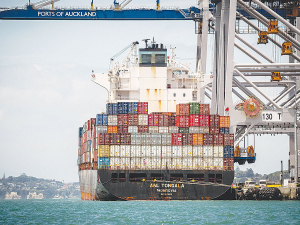Fonterra Suppliers Confident in Mainland Dairy Future
Fonterra's 460 milk suppliers in Australia, who will switch to Lactalis end of this month, are unfazed with the impending change.
 Joint shipping venture Kotahi - a collaboration between Fonterra and Silver Fern Farms - has a partnership with Maersk.
Joint shipping venture Kotahi - a collaboration between Fonterra and Silver Fern Farms - has a partnership with Maersk.
Supply chains throughout the world are under pressure but Fonterra is making its logistics well, says chief operating officer Fraser Whineray.
He says joint shipping venture Kotahi - a collaboration between Fonterra and meat processor Silver Fern Farms formed after the 2007-8 global financial crisis - is helping New Zealand exporters continue sending food to overseas customers.
Kotahi now has over 50 customers and exports one-third of New Zealand's container traffic.
Whineray told the Smaller Milk and Supply Herds (SMASH) conference in Cambridge recently that Kotahi has a partnership with Maersk, the biggest container shipper globally. Kotahi is one of the shipping company's top three customers.
It has helped Fonterra and other NZ exporters move products and empty containers around the world and avoid storage-related costs.
"And when you are in trouble, because we don't swing $50 million across over the rail of a ship every day, you don't invoice it, and you can build up a working capital and storage [at] a heck of a rate of knots, you need partners that you can trust. Maersk is absolutely that," says Whineray.
"It's been very important for NZ to get imports in, empty containers in, so that we can ship stuff out. It's tight but it's going well for us."
Fonterra's half-year results in May showed that the co-op was eight days behind on shipping, an equivalent of $400m working capital.
So, getting products off rail is as important for the co-operative as picking milk up from farms.
Whineray says shiping routes can get jammed up pretty quickly. He doesn't expect the current global shipping woes to go away soon.
"The supply chain won't relieve for a while: what it needs people to stop spending as much money on goods.
"They should only spend a little or they should spend on services or something made in their own countries or in Europe and America."
Whineray explained that it wasn't the Covid bug that was impacting global shipping.
"It's not because ships can't sail. Everything that floats is trying to work the Pacifc pretty hard," he says.
Stimulus packages by the US and European governmnets mean people in these countries are staying at home with lots of money to spend.
And because they can't attend sporting events, festivals or do tourism, they are spending it on household items like TVs and upgrading homes on "a global simultaneous splurge". And this, Whineray says, is putting global shipping well beyond its maximum capacity.
"And when that happens, you get two weeks wait of Port Long Beach in California (US's second busiest cargo port)," says Whineray.
"At one point there it was faster to go through Panama Canal and offload on the East Coast, because it's a big going from China to the US and China to Europe, which now has shipping rates on a spot basis six times higher than what they were."
Donald Trump's latest tariff tantrum has again thrown the world of trade into a new round of turmoil and uncertainty, and NZ is caught up in it.
The third edition of the NZ Dairy Expo, held in mid-February in Matamata, has shown that the KISS principle (keep it simple stupid) was getting a positive response from exhibitors and visitors alike.
Twenty years ago, South African dairy farm manager Louis Vandenberg was sent to a farm in Waikato to provide training on Afimilk technology.
Strong farmgate milk price is helping boost investment on farms, says PGG Wrightson chief executive Stephen Guerin.
Fonterra's 460 milk suppliers in Australia, who will switch to Lactalis end of this month, are unfazed with the impending change.
The 5+ A Day Charitable Trust has launched a collection of affordable recipes designed to turn everyday vegetables into seasonal stars.
OPINION: The UK dairy industry is celebrating a win after plant-based drink maker Oatly lost a long-running legal battle over…
OPINION: Staying with politics, with less than nine months to go before the general elections, there’s confusion in the Labour…